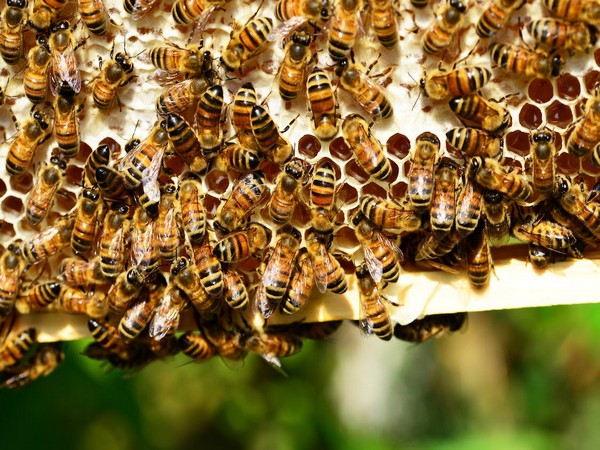

Researchers have successfully tested a novel strategy for enhancing honey bees‘ immune systems in an effort to help them fend off lethal viruses that have caused significant losses of the vital pollinator around the world.
The research group, which includes entomologists from the University of Florida, the USDA’s Agricultural Research Service, Louisiana State University, and the University of Nebraska-Lincoln, demonstrated in a recent study that encouraging honey bee cells to produce free radicals helped the bees resist a variety of viruses. In actuality, in large-scale field trials, the therapy significantly decreased, and in some cases, almost completely eradicated, virus activity.
“This approach is especially exciting because it doesn’t just target a specific type of virus but helps with many different viruses,” said Daniel Swale, senior author of the study. Swale is the associate director for training and special projects in the UF Emerging Pathogens Institute and associate professor in the UF/IFAS entomology and nematology department.
“Additionally, we demonstrated that our treatment works both in the lab and in colonies that each contain 80,000 bees in the field. This is huge because, in a hive setting, bees are exposed to so many different viruses and stressors, so successfully controlling viruses in that environment is very encouraging,” said Swale, who completed some of this research while at Louisiana State University.
Honey bee colonies, and the beekeepers who manage them, play an important role in food production by pollinating many crops. In recent years, honey bee populations have seen significant declines, and viruses, while not the top cause of honey bee deaths, are among the main contributors.
“Varroa mites are the number one cause of honey bee losses, but it’s important to point out that varroa mites, aside from physically weakening bees, also transmit viruses to bees. If we can mitigate viruses in honey bee colonies, that would be a big step forward,” said Michael Simone-Finstrom, a co-author of the study and a research molecular biologist with the ARS Honey Bee Breeding, Genetics, and Physiology Research Lab in Baton Rouge, Louisiana.
In the experiment, the researchers used a compound called pinacidil to alter potassium ion channels, a protein found in the cells of bees’ and most living things. Altering these channels produced slightly more free radicals.
“While free radicals are often bad for cell health, in moderate amounts they can be therapeutic, as we see in this study. In this case, the additional free radicals signal to the immune system to ramp up, which helps the bees fight off viruses,” said Troy Anderson, a co-author of the paper and a professor of entomology at the University of Nebraska-Lincoln.
The scientists administered the drug to honey bee colonies by mixing it into sugar water and drizzling the water over the honey comb at night. The bees then consumed the sugar water and fed it to their young. During the day, bees are constantly moving in an out of the hive, so giving them the treatment at night maximizes the number of bees that will receive it.
The treatment protected bees from six potentially deadly honey bee viruses: Israeli acute paralysis virus, deformed wing viruses A and B, black queen cell virus and Lake Sinai viruses 1 and 2. The researchers also showed that pinacidil helped more bees survive in colonies heavily infested with varroa mites.
Administering pinacidil to commercial honey bee hives may only be feasible for some beekeepers, the researchers said, but the study opens the door to identifying other active ingredients that may work better and cost less.
“One of the big takeaways from this study is that potassium ion channels can be a target for improving immune system function in honey bees and possibly other insects. We would like to find a molecule, such as a peptide, or a new technology that has the same effect as pinacidil but is more accessible to beekeepers,” Swale said.